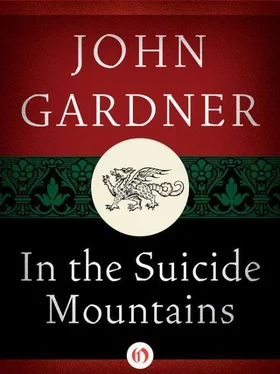John Gardner
In the Suicide Mountains
In a certain kingdom, in a certain land, there lived a dwarf who had an evil reputation, for he was humpbacked and ugly, with teeth like a saw’s and skin like a mushroom’s, and his legs were crooked and his eyebrows were hairy, as were his nostrils and ears, and the eyes that peered out from the shadow of those eyebrows were as mottled and devoid of vitality as two dead mackerels. It was rumored that he knew everything there was to know about black magic, and that by saying certain spells through his long, bushy beard he could cause an ordinary house to turn around so that its back door faced the street. It was said that when he liked he could turn himself into a flowery valley or a housefly, and that whenever he was angry, or even merely bored, he caused women to have warts and the village priest to get roaring drunk on tap water.
It was all lies and fictions, for the dwarf, whose name was Chudu the Goat’s Son (for his mother had been a goat and his father a magic fish), had all his life scrupulously avoided using magic for improper ends, or even, as a general rule, for proper ends. Even when his heart was swollen with rage, as it frequently was — and as it always was when he heard the villagers’ slanderous talk — he kept himself tightly reined in and merely counted to ten, or to a hundred, or to a thousand, or to whatever proved necessary. Walking down the street, keeping close to the curb, where he could easily step off into the gutter if some villager should desire to pass, he would listen to their slanders and be so furious that his eyes, lifeless no longer, would bulge and fill with boiling hot tears. Visiting the grocery store not far from where he lived, buying his supper of turnips and buttermilk and sometimes a can of tobacco for his pipe, he would hear (for his hearing was unusually acute) some foul-faced old woman mumble hoarsely into the ear of the creature at her side, “Take care! There goes Chudu the Goat’s Son! Don’t look him in the eye!”
Chudu the Goat’s Son would suck in air as if he intended to blow the whole grocery store down — as he could have if he’d wanted — and his mushroom-white face would go dark as a brick, but he would contain himself, would take his groceries to the counter and pay for them, would even smile, as best he could, at the grocer, and would carry them home to his shack at the edge of the village. His heart, all the way, would go wham, wham, wham! , but only when the door of his shack was closed and the shades were all drawn and the grocery sack was set carefully on the table, would the dwarf’s pent-up violence erupt. “Confound, confound, confound them!” he would yell in his reedy goat’s voice, stomping so hard he made the floorboards bend, and sometimes he would tear off his hat and hurl it to the rug and stomp on it, hard, with both feet, and stomp on it again and again until the hat cried out, “Mercy!”
He’d done nothing to harm anyone in all his days, though he’d been tempted. He was not to blame, despite village gossip, for the wine’s going sour in the Church of St. Laslas the Levitator, or for the year’s poor cabbage crop (on the contrary it was thanks to certain spells of his that the crop had done as well as it had, that year), nor was Chudu the Goat’s Son responsible for the steady increase in outrages in the Suicide Mountains (that was all the work of the six-fingered man, the man no jail in the world could hold), or for the tiler’s old mother’s falling tail-over-tincup down the coalchute. But it was useless to protest his innocence, useless to show by word or deed the essential benevolence, self-control, and unmagical orderliness of his nature. The dwarf had been chosen as the village scapegoat, and nothing he could do would change it.
This he had proved beyond a shadow of a doubt. He’d left baskets of food on the doorsteps of the poor and had hid himself in some nearby bushes to see the expressions of the people when they came out and saw. When they came and discovered what the baskets contained, their doughy faces would grow radiant as moons, and they would throw up their hands and say, “God be praised! Our luck has changed at last! It must be that Chudu the Goat’s Son has died, or perhaps he’s found somebody new to persecute. No doubt we’ll soon be as well off as everyone else!”
The Goat’s Son was hardly surprised by their reaction, though it grieved him and also, though he hid it, made him hopping mad. One day, to forestall their mistake, he left a large white card on the top of the basket, which said in bold black print, “From Chudu the Goat’s Son.” When the people he’d given it to saw the sign, they screwed up their eyes and pursed their lips and looked cautiously to left and right; then they got a long stick of the sort one might use to knock a wasp’s nest down, and they caught the handle of the basket with the stick and carefully, tremblingly carried the whole basket of fruit and bread and delicacies to the trash pile and burned it. Chudu the Goat’s Son tore off his hat and stomped on it ferociously — but quietly, taking care, as usual, that no one should see him, for the last thing he wanted was to support people’s foolish prejudice that that was his real nature.
The world rolled on, and things went from bad to worse for the Goat’s Son, and he began to feel depressed. He kept more and more to himself, getting through his days as best he might by reading the dictionary or trying out various new recipes for turnips or walking up into the mountains to sit by the railroad trestle, watching the great, square trains go over, thinking what horrible things he might do if he were the creature the villagers imagined him to be.
Sitting by the trestle, watching the trains come lumbering across with their warm and yellow lighted windows, the coaches crowded with half-sleeping travelers — now and then a bespectacled conductor leaning over to peer into the darkness and discover how far they’d gotten, figuring how early or late they were by now and whether or not he’d be at home and in bed by midnight — the dwarf would suddenly be overwhelmed by a feeling of irrational, jealous rage that positively awed him, so foreign was it (he told himself) to his real nature, or at any rate to the nature he had adopted, the nature he intended to live by. He could imagine the train exploding into a thousand fiery sparks, the long, high trestle bridge parting with a terrible crrraaack at the center, then horribly sagging, tumbling slowly, slowly into the chasm as a boulder sinks into a lake or one falls in one’s dreams. So vivid was the picture that the dwarf would sometimes imagine for a moment that he’d actually done it — made the train explode — not willfully but by accident, his knowledge and beliefs momentarily captive to some terrible, subhuman grotesquery at the center of his being. Sweat would pop out; his whole body would tremble. But the bridge, he would realize the next instant, was intact, the train still rumbling toward safety beyond the gorge.
“Perhaps,” thought the dwarf one wintry night when this had just happened to him, and with extraordinary force, “Perhaps I am going mad.” As if the thought had jerked him up, as a string jerks a puppet, he bounded to his feet and began banging his fists together, pacing back and forth on the high, moonlit ledge where he’d been sitting. “Woe is me,” he said aloud. “Am I in control or not?” He suddenly stopped stock-still and began tugging at his ice-crusted beard with both hands. His eyes widened, his mouth opened, and his expression became fixed. Then abruptly he brought out, his thick lips quivering, “One has serious reason to doubt one is as sane as one had hoped.”
Читать дальше












